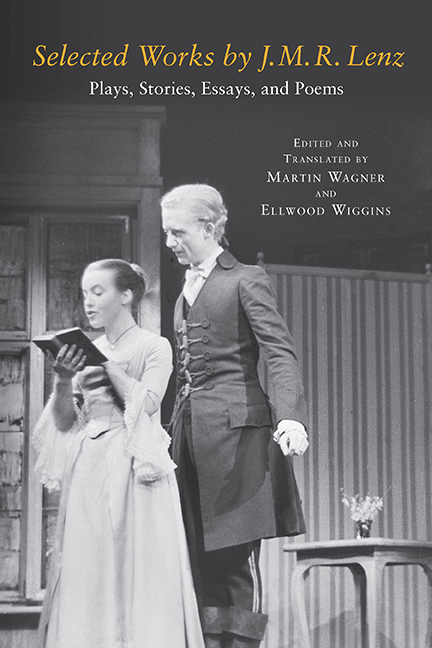Book contents
- Frontmatter
- Contents
- A Note on the Translation
- Introduction
- Part One Plays
- Part Two Stories
- Part Three Essays
- Remarks on the Theater
- On Götz von Berlichingen
- Review of The New Menoza: Written by the Author Himself
- On Scene Changes in Shakespeare
- On the Marriages of Soldiers
- Part Four Poems
- Chronology
- A Note on the Currencies in Lenz's Works
- Selected Bibliography
- Index
On Scene Changes in Shakespeare
from Part Three - Essays
Published online by Cambridge University Press: 27 March 2020
- Frontmatter
- Contents
- A Note on the Translation
- Introduction
- Part One Plays
- Part Two Stories
- Part Three Essays
- Remarks on the Theater
- On Götz von Berlichingen
- Review of The New Menoza: Written by the Author Himself
- On Scene Changes in Shakespeare
- On the Marriages of Soldiers
- Part Four Poems
- Chronology
- A Note on the Currencies in Lenz's Works
- Selected Bibliography
- Index
Summary
People have been railing, in so many different places and in such different ways, against the freedoms taken regarding the unities of time and place by this great—and I say it not out of fashionable enthusiasm, but with the soberest conviction—greatest of all modern dramatic poets. They forget that he was in no way the only one who did this; that already the ancients had scene changes (and indeed no one more than Aristophanes), though doing so was far more difficult because of the chorus; that the moderns too, even the French, Voltaire and others, at the most splendid points in their dramas, have found themselves compelled to do so. They forget that even Shakespeare implemented a scene change always only as an exception to the rule, always only as a sacrifice to higher virtues. And the greater the virtues thereby gained, the more freedom is granted to the poet to shape the play, for no one harbors any doubts in the moment of rapture. That in no way excuses young poets who try to imitate a great man's peculiarities for a thrill without being able to justify themselves with his motives, who wander around from place to place ad libitum, and who want to make us believe that Shakespeare's beauties consist merely in his unruliness.
As has been said—and let it be said for the last time on an issue that I do not wish to quarrel about with anyone:—Interest is the greatest purpose of the poet, to which all others must be subordinated—If this demands—if the sketching of certain characters, without which interest cannot be held, inevitably and unavoidably demands changing of time and place, then time and place can and must be sacrificed for it, and no one but a cold spectator who only comes for the sake of the scenery can and will complain about it. But if it does not demand this, what true poet will make things difficult for his actors and spectators with the changing of scenes, since the unity of the scene provides such obvious advantages for illusion at hand for him?
- Type
- Chapter
- Information
- Selected Works by J. M. R. LenzPlays, Stories, Essays, and Poems, pp. 296 - 300Publisher: Boydell & BrewerPrint publication year: 2019

